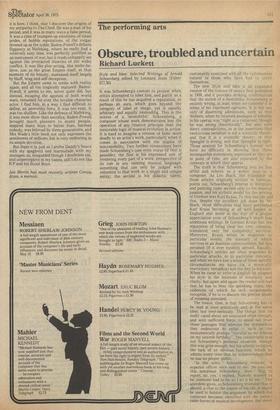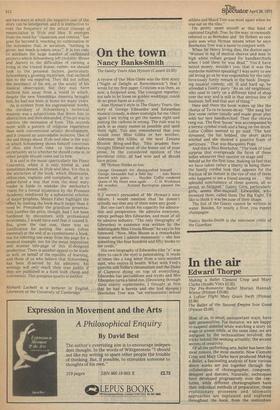Obscure, troubled and uncertain
Richard Luckett
Style and Idea: Selected Writings of Arnold Schoenberg edited by Leonard Stein (Faber E17.50) It was Schoenberg'-s custom to protest when critics attempted to label him, and partly as a result of this he has acquired a reputation, or perhaps an aura, which goes beyond the category of label or image, yet is equally arbitrary and equallyi misleading. This is the notion of a 'monolithic' Schoenberg, a composer whose work demonstrates less the operation of any creative principle than the inexorable logic of musical evolution in action. It is hard to imagine a version of fame more deadly to an artist's work, particularly when it comes in association with the stigma of inaccessibility. Two further connections' have made Schoenberg's case even worse (if that is possible): the first is his expressed aim of rendering every part of a work, irrespective of its role in any existing musical language, something that can only be judged with reference to that work as a single and unique entity; the second is his didactic talent, customarily exercised with all the ruthlessness natural to those who have had to teach themselves.
The new Style and Idea is an expanded version of the volume of essays first published in 1950, and it provides striking confirmation that the notion of a monolithic Schoenberg is entirely wrong, at least when we consider it in terms of his expressed opinions. It is full not only of disarming admissions, such as that Webern, when he retained passages of tonality in his operas, was "right as a composer, though he was wrong theoretically", but also with direct contradictions, as in the assertions t hat twelve-tone serialism is not a scientific theory, and that it is a scientific theory; or that Spengler is wrong, and that Spengler is right. Those anxious for Schoenberg's honour will have no difficulty in showing that these incompatible statements, separated as they are in point of time, are also separated by the contexts in which they appear.
The truth is that Schoenberg was no less artful and eclectic as a writer than as a composer. As Leo Black, the translator of those articles originally written in German, points out, Schoenberg's interest in literature and painting came second only to his musical passion, and his stylistic model for the writing of German was Karl Kraus. To this one can add that, despite the excellent job done by Mr Black, those difficulties that have prevented Karl Kraus becoming at all well known in England also stand in the way of a proper appreciation even of Schoenberg's much less ambitious writings. In German Kraus has the reputation of being clear but very complex; translated, only the complexity survives. Moreover, Kraus wrote in response to particular events, the memory of which survives in an Austrian consciousness, but has perished (if it ever existed) abroad. Equally, Schoenberg's articles are often responses to particular attacks, or to particular concerts, and when we have lost a sense of those specific circumstances we have (in a musically reactionary metaphor) lost the key to his tone. When he came to write in English he adapted his style in the interests of simplicity and clarity, but again and again the reader will feel that he has to hear the speaking voice, the cadences of which he will occasionally recognise, if he is to discern the precise shade of meaning intended.
The lesson, then, is that Schoenberg has to be read at once sensitively and, at the same time, not over-seriously. The things that he really cared about are reiterated often enough, and with sufficient force, to stand out from those passages that alienate the sympathies they endeavour to enlist – such as the monumentally grumpy "circular to my friends on my sixtieth birthday". The catastrophe was not Schoenberg's personal situation, though this was grim enough, but his artistic isolation, the lack of an obvious function, which he admits every time that he acknowledges that he has no proper public.
"In the army," Schoenberg records, -a superior officer once said to me: 'So you are this notorious Schoenberg, then.—Beg to report, sir, yes,' I replied. 'Nobody wanted to be, someone had to be, so I let it be me'." The anecdote gives, as Schoenberg intended that it should, a clue to the course of his life. It might be used to bolster the argument by which the composer becomes identified with the ineluctable forces of musical development. But there are two ways in which the negative cast of the story can be interpreted, and it is instructive to note the frequency of the actual concept of renunciation in Style and Idea. It emerges from the need for "classicism and control," but goes far beyond it, reaching its culmination in the statement that, in serialism, "nothing is given: but much is taken away". It is too easy to attribute the large number of unfinished projects which Schoenberg left (notably Moses and Aaron) to the difficulties of earning a living in the United States; rather, we should look to the personal factors, particularly Schoenberg's growing mysticism, that inclined him to the via negativa. They did not soften the mordancy of his wit, or the acuity of his musical observation, but they may have inclined him away from a world in which, despite the new friendships America brought him, he had not been at home for many years.
As is evident from his expressionist works, the corollary of Schoenberg's technical mastery was a subjectivism that drove him to abstraction and then demanded, if his art was to survive, the recreation of form. This accords more with a pattern of religious experience than with conventional artistic development, and it created an unavoidable isolation. One of the sad things about Style and Idea is the way in which Schoenberg shows himself conscious of this, and from time to time displays uncertainty as to whether he should come in, or other people should come out to him.
It is said in the music (particularly the Piano Concerto), whilst it is only hinted at, and sometimes denied, in Style and Idea. Yet this is the attraction of the book, which illuminates, obfuscates, explains and complains, all in so poker-faced a way that even the most wary reader is liable to mistake the anchorite's vision for a formal injunction by the Prussian Academy, reinforced by a substantial echelon of major prophets. Messrs Faber highlight the effect by making the book much larger than it need be. Presumably the grandiose presentation justifies the price, though, had I not been hardened by encounters with professional economists, I would have said that it caused it But, given the vast cost, there was no justification for putting the notes (often essential) at the end of so cumbersome a book, nor for referring one away from the page for a musical example, nor for the mean imposition and stunted title-page of this ill-designed production. There is another appeal to be made as well, on behalf of the republic of learning, and those of us who believe that Schoenberg has been ill-served by his admirers: his writings will only reach their true public if they are published in a form both cheap and convenient. This pompous quarto is neither.
Richard Luckett is a lecturer in English Literature at the University of Cambridge











































 Previous page
Previous page